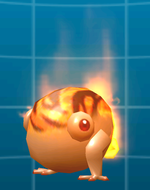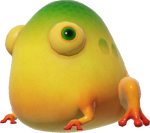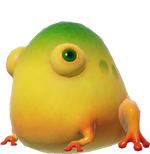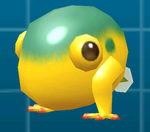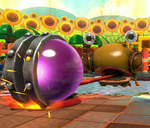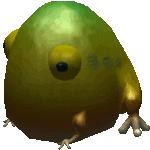Amphituber family
- "Wollyhop family" redirects here. For the family page with the Translucent Wollyhop, see Wollywog family.
The amphituber family is a family of frog-like amphibians in all of the Pikmin games. Nearly every member has the ability to crush Pikmin, either by floating upwards and slamming down, or by just jumping. Also similar to frogs, tadpole variants exist, although the only one seen in-game is the Wolpole. Members belong to the Amphicaris and Volcanus genera.
Members[edit]
Chillyhop[edit]
- Main article: Chillyhop.
Scientific name: Amphicaris frigidae
The Chillyhop is a variation of the Yellow Wollyhop found in Pikmin 4. It creates patches of ice when it lands after a jump, which will freeze any Pikmin type other than Ice Pikmin on contact. Its skin is not icy however, and can be safely attacked by any type of Pikmin. However, it is immune to being frozen.
Fiery Young Yellow Wollywog[edit]
- Main article: Fiery Young Yellow Wollywog.
Scientific name: Volcanus amphicaris frodendum
The Fiery Young Yellow Wollywog is a variation of the Young Yellow Wollywog found in Hey! Pikmin. It has an orange color with dark red markings, and its entire body is lit on fire, meaning it can only be defeated by Red Pikmin. The adult form has never been seen in any Pikmin game.
Masterhop[edit]
- Main article: Masterhop.
Scientific name: Amphicaris frondiferorum (advanced age)
The Masterhop is a giant Yellow Wollyhop which has survived into advanced old age. It can jump with enough force to leave a visible indent in certain, malleable environments.
Wolpole[edit]
- Main article: Wolpole.
Scientific name: Amphicaris frondiferorum (larva)
Wolpoles resemble tadpoles, and are in fact the juvenile form of Yellow Wollyhops. Wolpoles are one of the weakest enemies in the Pikmin series. In the first game, they only appear in the The Forest of Hope and The Distant Spring. They are typically a hard-to-get, low-reward enemy in that they are fast swimmers that run away and only produce one seed when carried to the Onion. In Pikmin 2, they are found in the Awakening Wood and Perplexing Pool areas, as well as being found in the sublevels of some caves. Also, they can occasionally get out of the water. When they do this, they will flop high in the air and their speed is drastically reduced.
Wollyhop[edit]
- Main article: Wollyhop.
Scientific name: Amphicaris albino
Wollyhops are a species of amphituber that live in the bowels of subterranean areas. They are gray and have red eyes, orange feet and an orange underside, and are usually found in watery cave-live areas, such as caves and The Forest Navel in Pikmin. They are defeated in the same manner as Yellow Wollyhops, but are more aggressive, and attack with a jump more readily. The lack of skin coloration is due to living in sunlight-free places.
Yellow Wollyhop[edit]
- Main article: Yellow Wollyhop.
Scientific name: Amphicaris frondiferorum
Yellow Wollyhops are a tall and yellow species of amphituber. They live near bodies of water out in the open like in The Distant Spring or Perplexing Pool as opposed to underground areas, though this is not always true. Like Wollyhops, they try to crush Pikmin by jumping into the air. To defeat them, it is best to approach from behind and throw Pikmin on top, calling them back before the creature falls.
Young Yellow Wollywog[edit]
- Main article: Young Yellow Wollywog.
Scientific name: Amphicaris frondendum
Young Yellow Wollywogs are Yellow Wollywogs in an earlier part of their life cycle, as seen in Hey! Pikmin. It is much smaller, with only one pair of legs, and part of its tail is still attached. It can be defeated by throwing a single Pikmin onto it.
In Pikmin Adventure[edit]
The following enemy exists in Pikmin Adventure, and is said in-game to belong to the amphituber family. It is, however, not canon.
Large-Mouth Wollywog[edit]
- Main article: Large-Mouth Wollywog.
The Large-Mouth Wollywog is the second major boss fought in Pikmin Adventure. It has eyes on stalks, a large mouth (as the name would imply) and can only be attacked at specific parts of its body at specific parts of the fight (i.e. the tongue at the start of the fight, its cheeks at the middle of the fight, and its back at the end of the fight). The Large Mouth Wollywog does not attack by jumping, but rather by extending its spike-ball-tongue at the player. This tongue will do damage whether or not it is the boss's current weak spot.
Naming[edit]
Amphituber is a portmanteau of "amphibian", the real world class that frogs are a part of, and "tuber", due to their potato-shaped body. Amphicaris is the genus for most members of this family, and comes from "amphibian". Volcanus is another described genus, and is Latin for "volcano", distinguishing the fire-based members from the rest.
In the original English localization of Pikmin and Pikmin 2, members of this family were known as "Wollywog" and "Wogpole". However, "wog" is an offensive slur in the United Kingdom and Australia. As a result, for New Play Control! Pikmin and New Play Control! Pikmin 2, the European releases re-translated them to "Wollyhop" and "Wolpole", with "hop" referencing the creatures' powerful leaps. This continued for Pikmin 3, with American regions keeping the original names and European ones receiving the changed names. Starting with the Nintendo Switch releases of Pikmin 1 and Pikmin 2, the European names were brought into all English regions, meaning for Pikmin 4 and beyond there is no "original" equivalent for any newly-discovered creatures.
Names in other languages[edit]
|
The following article or section needs help from someone who can translate Chinese/Korean text. |
| Language | Name | Meaning | Notes |
|---|---|---|---|
| イモガエル科? Imo Gaeru Ka |
Potato frog family | ||
| 薯薯蛙科 | |||
| Amfipiepers | Amphipotatoes | From "amfibie" (amphibian) and "piepers" (potatoes) | |
| amphibercules | Amphitubers | From "amphibien" (amphibian) and "tubercule" (tuber) | |
| Amphituben | Amphitubes | From "Amphibien" (amphipian) and "Tuben" (tubes) | |
| Anfituberi | Amphitubers | From "anfibi" (amphibias) and "tuberi" (tubers) | |
| 덩이줄기개구리 과 | |||
| Anfiberulídeos | From "anfíbio" (amphibian) | ||
| Anfibérculos | Amphibers | From "anfibio" (amphibian) and "tubérculo" (tuber) |
Trivia[edit]
- In Pikmin, the Wollyhop and the Yellow Wollyhop share almost exactly the same bottom. Besides a small bit of the belly, front legs and "chin", as well as the Wollyhop's "tail", the geometry of the bottom half of the model is exactly the same.
